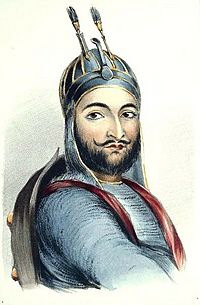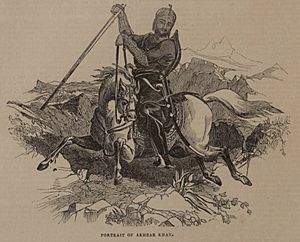Wazir Akbar Khan facts for kids
Quick facts for kids Wazir Akbar Khanوزير اکبر خان |
|
|---|---|
| Ghazi | |

A drawing of Akbar Khan by Vincent Eyre
|
|
| Emir of Afghanistan | |
| Reign | May 1842 – 1843 |
| Predecessor | Shuja Shah Durrani |
| Successor | Dost Mohammad Khan |
| Born | 1816 Mazar-i-Sharif, Durrani Empire |
| Died | September 1847 (aged 31) Jalalabad, Emirate of Afghanistan |
| Burial | Blue Mosque, Mazar-i-Sharif, Afghanistan |
| House | Barakzai dynasty |
| Father | Dost Mohammad Barakzai |
| Mother | Mermən Khadija Popalzai |
| Religion | Sunni Islam |
| Military career | |
| Battles/wars | Battle of Jamrud Kabul Expedition (1842) 1842 retreat from Kabul Battle of Gandamak Dost Mohammad's Campaign to Jalalabad (1834) |
Wazir Akbar Khan (born Mohammad Akbar Khan) was an important Afghan leader. He was a prince, a skilled general, and even ruled as emir (leader) of Afghanistan for about a year. He was also the main advisor to his father, Dost Mohammad Khan, until he passed away in 1847.
Akbar Khan first became famous in 1837 during the Battle of Jamrud. He tried to take back Peshawar, which was an important city for Afghanistan, from the Sikh Empire. He also played a big role in the First Anglo-Afghan War (1839-1842). He led the Afghan people in Kabul against the British from 1841 to 1842. He is especially known for a major event in January 1842. During this time, he led an attack on the British army as they were leaving Kabul. Almost all of them were defeated at a place called Gandamak pass.
Akbar Khan became the emir of Afghanistan in May 1842. He ruled until his father, Dost Mohammad Khan, returned in 1843. Wazir Akbar Khan died in 1847 from a disease called cholera.
Early Life of Wazir Akbar Khan
Akbar Khan was born in 1816. His full name was Mohammad Akbar Khan. His father was Dost Mohammad Khan, who was the ruler of Afghanistan. His mother was Mermən Khadija Popalzai.
Dost Mohammad Barakzai had many children. He had 16 wives, 27 sons (including Akbar Khan), and 25 daughters.
Akbar Khan's Adult Life and Wars
In 1834, Akbar Khan joined his father, Dost Mohammad Khan, in a military campaign. This campaign was aimed at Jalalabad.
A few years later, in 1837, Akbar Khan led his father's Muslim forces. They fought against the Sikhs at the Battle of Jamrud. This battle happened near present-day Peshawar. Even though they fought well, Dost Mohammad Khan did not try to take Peshawar back right after the battle.
Instead, Dost Mohammad Khan asked Lord Auckland, the British governor-general in India, for help against the Sikh Empire. This request led to the British getting involved in Afghanistan. This period is known as the "Great Game." It was a competition between the British and Russian empires for influence in Afghanistan.
Akbar Khan later led a rebellion in Kabul. This was against the British Indian group led by William McNaughten and Alexander Burnes. In November 1841, he surrounded the British forces in Kabul. These forces were led by Major-General William Elphinstone.
General Elphinstone agreed to leave Kabul safely with his British soldiers and about 12,000 Indian helpers. However, they were attacked in January 1842. Almost all of them were defeated. This event is known as the Massacre of Elphinstone's Army.
In May 1842, Akbar Khan captured Bala Hissar in Kabul. He then became the new emir of Afghanistan. When his father, Dost Mohammad Khan, returned in 1843, Akbar Khan was very powerful. He became the wazir (chief minister) and the next in line to rule after his father.
In September 1847, a serious outbreak of cholera happened in Kabul. Akbar Khan caught the disease and passed away soon after.
See also
 | Janet Taylor Pickett |
 | Synthia Saint James |
 | Howardena Pindell |
 | Faith Ringgold |


